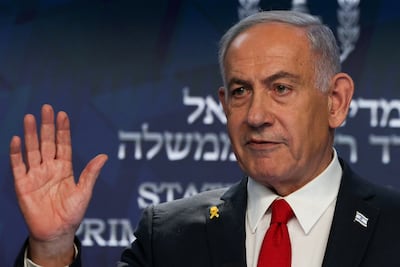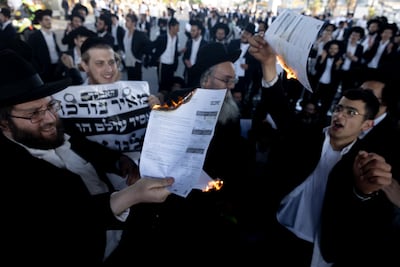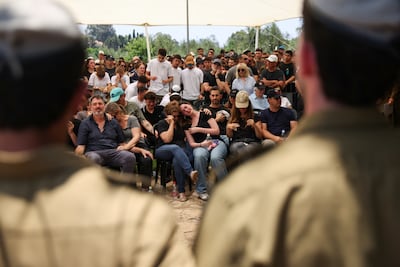In only a matter of days it has become clear that Israeli Prime Minister Benjamin Netanyahu’s far-right government is the closest it has come to collapse.
It is not because of the catastrophic security failure of the October 7, 2023, attacks; the Israeli hostages still languishing in Gaza; nor the unprecedented international isolation facing Israel as anger mounts over its war in the strip.
Instead, Israel could be on the cusp of new elections because of an internal dispute tearing apart Mr Netanyahu’s coalition, which turns on its failure to exempt ultra-Orthodox young men from being conscripted into the military. Passing such a law is a priority of certain parties, and a demand they made of Mr Netanyahu when joining his coalition.
The army is viewed as a melting pot of secular and religious, men and women, in which young ultra-Orthodox men are highly likely to drift from the conservative ways.
Many ultra-Orthodox people are ambivalent about nationalism and the state of Israel, some even anti-Zionist, viewing the state as a man-made enterprise and not the true Israel to be brought about only by God.
The crisis is hardly a surprise. How ultra-Orthodox Israelis interact with wider national life is a question that has dogged the country for decades. The community’s leaders try to guard their people from anything that might interrupt their secluded, strict way of life.
That mission is becoming harder to pull off as the group's numbers have grown by more than 500 per cent since 1979, according to a 2023 report by the Haredi Policy Research Institute.
While the question of military service was always a part of the debate, it also extended to issues like participation (particularly by men) in the general workforce, how the community educates its children, and the subsidies it receives.
But with the Israeli military suffering a manpower shortage during the Gaza war, new security problems on the horizon and major fatigue in reservist troops, the ultra-Orthodox absence from duty is enraging all other Israelis, from left to right.
How did the crisis begin?
Last week, United Torah Judaism, one of the two ultra-Orthodox parties in Mr Netanyahu’s coalition, backed dissolving the Knesset to pave the way for elections. On Monday, the other party, Shas, announced that it backed the same.
Shas’s involvement means that Mr Netanyahu would no longer have a majority in the Knesset, a devastating blow as opposition parties would easily have the numbers to topple the government.
A way out of the crisis could lie with the ultra-Orthodox parties and Yuli Edelstein, chairman of the Knesset’s Foreign Affairs and Defence Committee, who have not been able to find a compromise, despite last-ditch talks. Mr Edelstein, a member of Mr Netanyahu’s Likud party, previously vowed to find a solution that “significantly increases [the military’s] conscription base", echoing frustration by many in the ultranationalist, hawkish coalition at the ultra-Orthodox refusal to serve.
Last week a spiritual leader in the Shas party said Mr Edelstein’s “soul is an abomination”.
Is there room for compromise?
An enlistment bill being drafted by Mr Edelstein’s committee reportedly includes major financial sanctions against ultra-Orthodox men who ignore draft orders, including the loss of tax benefits and subsidies. There are even reports that the sanctions would prevent dodgers from travelling abroad.
While it is possible some of these sanctions could be negotiated on, the main disagreement about whether the community should be drafted at all appears insurmountable.
“I don’t see that they’ll find a compromise regarding the scope of sanctions,” said Aviv Bushinsky, a former spokesman for Mr Netanyahu.
“What they want to do is to find a way that the sanctions will be implemented not immediately but within a year from now … but again you hear the spiritual leaders say no way by all means."
What could happen next?
Opponents of Mr Netanyahu now have to decide how to best approach a possible bill to dissolve parliament. Such a bill would have to pass a preliminary vote and then three readings.
If it does not complete these steps then there is a delay until the same bill can be voted on again, giving Mr Netanyahu months to continue negotiations with coalition partners for a solution.
How likely are the ultra-Orthodox parties to topple the government?
While the rage of the ultra-Orthodox parties is palpable, many commentators note that they are unlikely after new elections to find a government even close to as sympathetic as Mr Netanyahu’s.
Emphasising the unjustness of ultra-Orthodox exemptions while sympathising with the sacrifice of soldiers is a crucial tactic of opposition parties, whose voters are unlikely to tolerate supporting a government that gives the ultra-Orthodox leeway on the issue.
Despite this, the anger and threats of the community’s political and spiritual leaders have never been so strong. It is also uncertain the extent to which the leadership views triggering elections as a matter of worldly tactical politics or God’s will.
What does this mean for Netanyahu?
Mr Netanyahu is by far the most successful politician in Israeli history, serving several terms in office. He is viewed as a truly gifted political survivor and has so far weathered the scandal of the October 7 attacks, despite many believing he would not last six months after at first, and a continuing corruption trial.
However, Mr Bushinsky said that his current position is very bad.
“As things are at the moment, Netanyahu is being dragged, not leading, not controlling the situation,” he said. “His approach now is to hug his allies and say everyone is having good conversations. This is not customary to him. He is usually very aggressive and tries to keep control.
“Netanyahu wants to reach something more tangible – a flag he can wave, be it a strike on Iran, total victory in Gaza. At the moment to go to elections without such tangible successes would be devastating.”
Graduated from the American University of Sharjah
She is the eldest of three brothers and two sisters
Has helped solve 15 cases of electric shocks
Enjoys travelling, reading and horse riding
COMPANY%20PROFILE
%3Cp%3E%3Cstrong%3EName%3A%20%3C%2Fstrong%3ESmartCrowd%0D%3Cbr%3E%3Cstrong%3EStarted%3A%20%3C%2Fstrong%3E2018%0D%3Cbr%3E%3Cstrong%3EFounder%3A%20%3C%2Fstrong%3ESiddiq%20Farid%20and%20Musfique%20Ahmed%0D%3Cbr%3E%3Cstrong%3EBased%3A%20%3C%2Fstrong%3EDubai%0D%3Cbr%3E%3Cstrong%3ESector%3A%20%3C%2Fstrong%3EFinTech%20%2F%20PropTech%0D%3Cbr%3E%3Cstrong%3EInitial%20investment%3A%20%3C%2Fstrong%3E%24650%2C000%0D%3Cbr%3E%3Cstrong%3ECurrent%20number%20of%20staff%3A%3C%2Fstrong%3E%2035%0D%3Cbr%3E%3Cstrong%3EInvestment%20stage%3A%20%3C%2Fstrong%3ESeries%20A%0D%3Cbr%3E%3Cstrong%3EInvestors%3A%20%3C%2Fstrong%3EVarious%20institutional%20investors%20and%20notable%20angel%20investors%20(500%20MENA%2C%20Shurooq%2C%20Mada%2C%20Seedstar%2C%20Tricap)%3C%2Fp%3E%0A
UAE currency: the story behind the money in your pockets
UAE currency: the story behind the money in your pockets
EXPATS
%3Cp%3E%3Cstrong%3EDirector%3A%3C%2Fstrong%3E%20Lulu%20Wang%26nbsp%3B%3C%2Fp%3E%0A%3Cp%3E%3Cstrong%3EStars%3A%3C%2Fstrong%3E%20Nicole%20Kidman%2C%20Sarayu%20Blue%2C%20Ji-young%20Yoo%2C%20Brian%20Tee%2C%20Jack%20Huston%3C%2Fp%3E%0A%3Cp%3E%3Cstrong%3ERating%3A%3C%2Fstrong%3E%204%2F5%3C%2Fp%3E%0A
The biog
Family: wife, four children, 11 grandchildren, 16 great-grandchildren
Reads: Newspapers, historical, religious books and biographies
Education: High school in Thatta, a city now in Pakistan
Regrets: Not completing college in Karachi when universities were shut down following protests by freedom fighters for the British to quit India
Happiness: Work on creative ideas, you will also need ideals to make people happy
UAE currency: the story behind the money in your pockets
Tips for job-seekers
- Do not submit your application through the Easy Apply button on LinkedIn. Employers receive between 600 and 800 replies for each job advert on the platform. If you are the right fit for a job, connect to a relevant person in the company on LinkedIn and send them a direct message.
- Make sure you are an exact fit for the job advertised. If you are an HR manager with five years’ experience in retail and the job requires a similar candidate with five years’ experience in consumer, you should apply. But if you have no experience in HR, do not apply for the job.
David Mackenzie, founder of recruitment agency Mackenzie Jones Middle East
Women%E2%80%99s%20Asia%20Cup
%3Cp%3E%3Cstrong%3EUAE%20fixtures%3C%2Fstrong%3E%3Cbr%3ESun%20Oct%202%2C%20v%20Sri%20Lanka%3Cbr%3ETue%20Oct%204%2C%20v%20India%3Cbr%3EWed%20Oct%205%2C%20v%20Malaysia%3Cbr%3EFri%20Oct%207%2C%20v%20Thailand%3Cbr%3ESun%20Oct%209%2C%20v%20Pakistan%3Cbr%3ETue%20Oct%2011%2C%20v%20Bangladesh%3Cbr%3E%3Cbr%3E%3Cstrong%3EUAE%20squad%3C%2Fstrong%3E%3Cbr%3EChaya%20Mughal%20(captain)%2C%20Esha%20Oza%2C%20Kavisha%20Kumari%2C%20Khushi%20Sharma%2C%20Theertha%20Satish%2C%20Lavanya%20Keny%2C%20Priyanjali%20Jain%2C%20Suraksha%20Kotte%2C%20Natasha%20Cherriath%2C%20Indhuja%20Nandakumar%2C%20Rishitha%20Rajith%2C%20Vaishnave%20Mahesh%2C%20Siya%20Gokhale%2C%20Samaira%20Dharnidharka%2C%20Mahika%20Gaur%3C%2Fp%3E%0A
WHY%20AAYAN%20IS%20'PERFECT%20EXAMPLE'
%3Cp%3EDavid%20White%20might%20be%20new%20to%20the%20country%2C%20but%20he%20has%20clearly%20already%20built%20up%20an%20affinity%20with%20the%20place.%3Cbr%3E%3Cbr%3EAfter%20the%20UAE%20shocked%20Pakistan%20in%20the%20semi-final%20of%20the%20Under%2019%20Asia%20Cup%20last%20month%2C%20White%20was%20hugged%20on%20the%20field%20by%20Aayan%20Khan%2C%20the%20team%E2%80%99s%20captain.%3Cbr%3E%3Cbr%3EWhite%20suggests%20that%20was%20more%20a%20sign%20of%20Aayan%E2%80%99s%20amiability%20than%20anything%20else.%20But%20he%20believes%20the%20young%20all-rounder%2C%20who%20was%20part%20of%20the%20winning%20Gulf%20Giants%20team%20last%20year%2C%20is%20just%20the%20sort%20of%20player%20the%20country%20should%20be%20seeking%20to%20produce%20via%20the%20ILT20.%3Cbr%3E%3Cbr%3E%E2%80%9CHe%20is%20a%20delightful%20young%20man%2C%E2%80%9D%20White%20said.%20%E2%80%9CHe%20played%20in%20the%20competition%20last%20year%20at%2017%2C%20and%20look%20at%20his%20development%20from%20there%20till%20now%2C%20and%20where%20he%20is%20representing%20the%20UAE.%3Cbr%3E%3Cbr%3E%E2%80%9CHe%20was%20influential%20in%20the%20U19%20team%20which%20beat%20Pakistan.%20He%20is%20the%20perfect%20example%20of%20what%20we%20are%20all%20trying%20to%20achieve%20here.%3Cbr%3E%3Cbr%3E%E2%80%9CIt%20is%20about%20the%20development%20of%20players%20who%20are%20going%20to%20represent%20the%20UAE%20and%20go%20on%20to%20help%20make%20UAE%20a%20force%20in%20world%20cricket.%E2%80%9D%C2%A0%3C%2Fp%3E%0A
Countries offering golden visas
UK
Innovator Founder Visa is aimed at those who can demonstrate relevant experience in business and sufficient investment funds to set up and scale up a new business in the UK. It offers permanent residence after three years.
Germany
Investing or establishing a business in Germany offers you a residence permit, which eventually leads to citizenship. The investment must meet an economic need and you have to have lived in Germany for five years to become a citizen.
Italy
The scheme is designed for foreign investors committed to making a significant contribution to the economy. Requires a minimum investment of €250,000 which can rise to €2 million.
Switzerland
Residence Programme offers residence to applicants and their families through economic contributions. The applicant must agree to pay an annual lump sum in tax.
Canada
Start-Up Visa Programme allows foreign entrepreneurs the opportunity to create a business in Canada and apply for permanent residence.
Defined benefit and defined contribution schemes explained
Defined Benefit Plan (DB)
A defined benefit plan is where the benefit is defined by a formula, typically length of service to and salary at date of leaving.
Defined Contribution Plan (DC)
A defined contribution plan is where the benefit depends on the amount of money put into the plan for an employee, and how much investment return is earned on those contributions.
Springsteen: Deliver Me from Nowhere
Director: Scott Cooper
Starring: Jeremy Allen White, Odessa Young, Jeremy Strong
Rating: 4/5
COMPANY%20PROFILE
%3Cp%3E%3Cstrong%3EName%3A%3C%2Fstrong%3E%20PlanRadar%3Cbr%3E%3Cstrong%3EStarted%3A%20%3C%2Fstrong%3E2013%3Cbr%3E%3Cstrong%3ECo-founders%3A%20%3C%2Fstrong%3EIbrahim%20Imam%2C%20Sander%20van%20de%20Rijdt%2C%20Constantin%20K%C3%B6ck%2C%20Clemens%20Hammerl%2C%20Domagoj%20Dolinsek%3Cbr%3E%3Cstrong%3EBased%3A%20%3C%2Fstrong%3EVienna%2C%20Austria%3Cbr%3E%3Cstrong%3ESector%3A%20%3C%2Fstrong%3EConstruction%20and%20real%20estate%3Cbr%3E%3Cstrong%3ECurrent%20number%20of%20staff%3A%20%3C%2Fstrong%3E400%2B%3Cbr%3E%3Cstrong%3EInvestment%20stage%3A%20%3C%2Fstrong%3ESeries%20B%3Cbr%3E%3Cstrong%3EInvestors%3A%3C%2Fstrong%3E%20Headline%2C%20Berliner%20Volksbank%20Ventures%2C%20aws%20Gr%C3%BCnderfonds%2C%20Cavalry%20Ventures%2C%20Proptech1%2C%20Russmedia%2C%20GR%20Capital%3C%2Fp%3E%0A
Thank You for Banking with Us
Director: Laila Abbas
Starring: Yasmine Al Massri, Clara Khoury, Kamel El Basha, Ashraf Barhoum
Rating: 4/5
COMPANY%20PROFILE
%3Cp%3E%3Cstrong%3ECompany%3A%20%3C%2Fstrong%3EGrowdash%0D%3Cbr%3E%3Cstrong%3EStarted%3A%20%3C%2Fstrong%3EJuly%202022%0D%3Cbr%3E%3Cstrong%3EFounders%3A%20%3C%2Fstrong%3ESean%20Trevaskis%20and%20Enver%20Sorkun%0D%3Cbr%3E%3Cstrong%3EBased%3A%20%3C%2Fstrong%3EDubai%2C%20UAE%0D%3Cbr%3E%3Cstrong%3EIndustry%3A%20%3C%2Fstrong%3ERestaurant%20technology%0D%3Cbr%3E%3Cstrong%3EFunding%20so%20far%3A%3C%2Fstrong%3E%20%24750%2C000%0D%3Cbr%3E%3Cstrong%3EInvestors%3A%20%3C%2Fstrong%3EFlat6Labs%2C%20Plus%20VC%2C%20Judah%20VC%2C%20TPN%20Investments%20and%20angel%20investors%2C%20including%20former%20Talabat%20chief%20executive%20Abdulhamid%20Alomar%2C%20and%20entrepreneur%20Zeid%20Husban%3C%2Fp%3E%0A
SERIE A FIXTURES
Friday Sassuolo v Torino (Kick-off 10.45pm UAE)
Saturday Atalanta v Sampdoria (5pm),
Genoa v Inter Milan (8pm),
Lazio v Bologna (10.45pm)
Sunday Cagliari v Crotone (3.30pm)
Benevento v Napoli (6pm)
Parma v Spezia (6pm)
Fiorentina v Udinese (9pm)
Juventus v Hellas Verona (11.45pm)
Monday AC Milan v AS Roma (11.45pm)
Ferrari 12Cilindri specs
Engine: naturally aspirated 6.5-liter V12
Power: 819hp
Torque: 678Nm at 7,250rpm
Price: From Dh1,700,000
Available: Now
More from Neighbourhood Watch:
Madrid Open schedule
Men's semi-finals
Novak Djokovic (1) v Dominic Thiem (5) from 6pm
Stefanos Tsitsipas (8) v Rafael Nadal (2) from 11pm
Women's final
Simona Halep (3) v Kiki Bertens (7) from 8.30pm
SPECS%3A%20Polestar%203
%3Cp%3E%3Cstrong%3EEngine%3A%20%3C%2Fstrong%3ELong-range%20dual%20motor%20with%20400V%20battery%3Cbr%3E%3Cstrong%3EPower%3A%20%3C%2Fstrong%3E360kW%20%2F%20483bhp%3Cbr%3E%3Cstrong%3ETorque%3A%20%3C%2Fstrong%3E840Nm%3Cbr%3E%3Cstrong%3ETransmission%3A%20%3C%2Fstrong%3ESingle-speed%20automatic%3Cbr%3E%3Cstrong%3EMax%20touring%20range%3A%3C%2Fstrong%3E%20628km%3Cbr%3E%3Cstrong%3E0-100km%2Fh%3A%3C%2Fstrong%3E%204.7sec%3Cbr%3E%3Cstrong%3ETop%20speed%3A%3C%2Fstrong%3E%20210kph%20%3Cbr%3E%3Cstrong%3EPrice%3A%20%3C%2Fstrong%3EFrom%20Dh360%2C000%3Cbr%3E%3Cstrong%3EOn%20sale%3A%20%3C%2Fstrong%3ESeptember%3Cbr%3E%3C%2Fp%3E%0A
THE%20SPECS
%3Cp%3EEngine%3A%204.4-litre%20twin-turbo%20V8%20hybrid%0D%3Cbr%3EPower%3A%20653hp%20at%205%2C400rpm%0D%3Cbr%3ETorque%3A%20800Nm%20at%201%2C600-5%2C000rpm%0D%3Cbr%3ETransmission%3A%208-speed%20auto%0D%3Cbr%3E0-100kph%20in%204.3sec%0D%3Cbr%3ETop%20speed%20250kph%0D%3Cbr%3EFuel%20consumption%3A%20NA%0D%3Cbr%3EOn%20sale%3A%20Q2%202023%0D%3Cbr%3EPrice%3A%20From%20Dh750%2C000%0D%3Cbr%3E%3C%2Fp%3E%0A
Essentials
The flights
Emirates and Etihad fly direct from the UAE to Los Angeles, from Dh4,975 return, including taxes. The flight time is 16 hours. Alaska Airlines, United Airlines, Delta Air Lines, Aeromexico and Southwest all fly direct from Los Angeles to San Jose del Cabo from Dh1,243 return, including taxes. The flight time is two-and-a-half hours.
The trip
Lindblad Expeditions National Geographic’s eight-day Whales Wilderness itinerary costs from US$6,190 (Dh22,736) per person, twin share, including meals, accommodation and excursions, with departures in March and April 2018.





